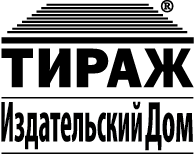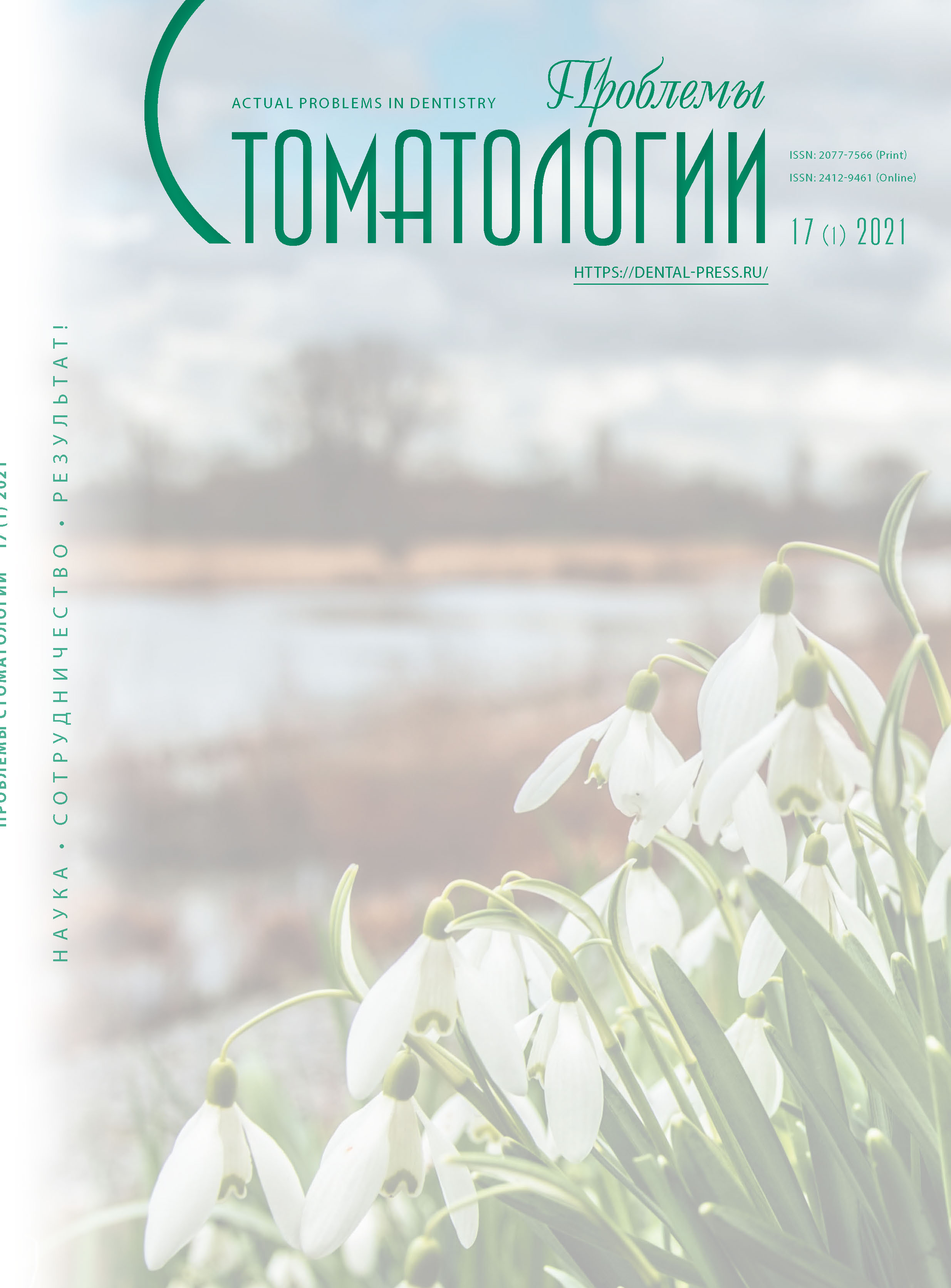Tyumen, Tyumen, Russian Federation
Tyumen, Tyumen, Russian Federation
Tyumen', Tyumen, Russian Federation
Omsk, Omsk, Russian Federation
Tyumen, Tyumen, Russian Federation
Subject. The study of the results of the examination of the patients with the temporomandibular joint dysfunction depending on the habitual physical activity type. The aim of the study is to estimate the results of the examination of the patients with the temporomandibular joint dysfunction depending on the habitual physical activity type. Methodology. 105 patients (18 male patients and 87 female patients) aged 20-35 with the occlusive temporomandibular joint dysfunction (K07.6 Diseases of temporomandibular joint) living in Tyumen and in Tyumen region were examined. The study was carried out at “the Regional stomatological polyclinic” in Tyumen. Results. The study of the peculiarities of temporomandibular joint dysfunction depending on the habitual physical activity type was carried out. The clinical results of the dynamic observation and complex functional study in 105 patients aged 20-35 having occlusive temporomandibular joint dysfunction were given. Conclusion. The results showed that there was a direct connection between the changes in dentomandibular system and the physical activity level in 105 patients aged 20-35 with occlusive temporomandibular joint dysfunction living in Tyumen and Tyumen region. In the studied subjects, with a a low level of habitual motor activi 8.43% more defects in the dentition were found in comparison with a high level of habitual motor activity, and by 6.02% more than in comparison with an average level of habitual motor activity, the pathological abrasion of the teeth was almost 2 times higher compared with a high level of habitual motor activity. An additional examination method based on computed tomography showed a violation of the articular relationship in 67.3% of cases, signs of TMJ hypermobility one and two-sided in 28.2%, changes in the position of the condyles in the joint in 33.33% of cases, in the group with a low level of habitual motor activity.
TMJ, temporomandibular joint, dysfunction, physical activity level, physiological status
1. Arsenina O.I., Komarova A.V., Popova N.V. i dr. Primenenie elastokorrektora dlya ustraneniya diskoordinacii raboty zhevatel'nyh myshc u pacientov s disfunkciey visochno-nizhnechelyustnogo sustava. Stomatologiya. 2020;99(2):61-65. [O.I. Arsenina, A.V. Komarova, N.V. Popova, D.O. Egorova. The use of elastocorrector for the removal of dyscoordination of masticatory muscles work in the patients with the temporomandibular joint dysfunction. Dentistry. 2020;99(2):61-65. (In Russ.)].
2. Abolmasov N.N., Prygunov K.A., Abolmasov N.G., Adaeva I.A. Ocenka okklyuzionno-artikulyacionnyh vzaimootnosheniy zubnyh ryadov dlya vyyavleniya etiologicheskih faktorov i simptomov razlichnyh patologicheskih sostoyaniy (chast' II). Institut stomatologii. 2018;2(79):96-99. [N.N. Abolmasov, K.A. Prygunov, N.G. Abolmasov, I.A. Adaeva. The estimation of occlusive and articulation relationship of dental rows to reveal ethiological factors and symptoms of different pathological states (part II). Institute of stomatology. 2018;2(79):96-99. (In Russ.)]. https://elibrary.ru/item.asp?id=35340583
3. Beynarovich S.V., Filimonova O.I. Sovremennyy vzglyad na etiopatogenez disfunkcional'nyh rasstroystv visochno-nizhnechelyustnogo sustava. Kubanskiy nauchnyy medicinskiy vestnik. 2018;25(6):164-170. [S.V. Beynarovich, O.I. Filimonova. Modern view on the ethiopathogenesis dysfunction disturbances of the temporomandibular joint. Kuban scientific medical vestnik. 2018;25(6):164-170. (In Russ.)].
4. Boyan A.M. Effektivnost' razlichnyh metodov rasslableniya zhevatel'nyh myshc u bol'nyh s myshechno-sustavnoy disfunkciey visochno-nizhnechelyustnyh sustavov. Vestnik stomatologii. 2017;1(98):30-36. [A.M. Boyan. The efficiency of different methods of relaxation of masticatory muscles in the patients with muscular and arthral dysfunction of temporomandibular joints. Vestnik of dentistry. 2017;1(98):30-36. (In Russ.)]. https://elibrary.ru/item.asp?id=32318195
5. Zagorko M.V. Kachestvo zhizni i psihologicheskie osobennosti pacientov s disfunkciyami visochno-nizhnechelyustnogo sustava. Aktual'nye voprosy sovremennoy nauki i obrazovaniya. sbornik statey mezhdunarodnoy nauchno-prakticheskoy konferencii : v 2 ch. 2020:173-175. [M.V. Zagorko. The life quality and psychological peculiarities in patients with temporomandibular joint dysfunctions in the collection: actual issues of the modern science and education. Collection of the articles of the international and practical conference: 2 parts. 2020:173-175. (In Russ.)].
6. Isaykin A.I., Smirnova D.S. Disfunkciya visochno-nizhnechelyustnogo sustava. RMZh. 2017;25(24):1750-1755. [A.I. Isaykin, A.I. Smirnova. Temporomandibular joint dysfunction. RMZH. 2017;25(24):1750-1755. (In Russ.)].
7. Martyusheva M.V., Mal'ceva O.A. Stomatologicheskiy status pacientov, nuzhdayuschihsya v proteticheskom lechenii. Vyatskiy medicinskiy vestnik. 2018;1(57):71-75. [M.V. Martyusheva, O.A. Maltseva. Stomatological status of the patients requiring prosthetics treatment. Vyatka medical vestnik. 2018;1(57):71-75. (In Russ.)]. https://elibrary.ru/item.asp?id=35080844
8. Mamchic E.V., Kuratov I.A., Kolpakov V.V., Bragin A.V. i dr. Patent na izobretenie RF 2541825 c1. Nes'emnyy apparat dlya lecheniya disfunkciy visochno-nizhnechelyustnogo sustava. 20.02.2015. № 2013138119/14. 2013. [E.V. Mamchits, I.A. Kuratov, V.V. Kopakov, A.V. Bragin et al. Patent for the invention RU 2541825 c1. Non removable device for the treatment of temporomandibular joint dysfunctions. 20.02.2015. № 2013138119/14. 14.08.2013. (In Russ.)].
9. Moskovskiy A.V., Vel'makina I.V. Izuchenie roli telerentgenografii cherepa v pryamoy proekcii dlya ranney diagnostiki sindroma myshechno-sustavnoy disfunkcii visochno-nizhnechelyustnogo sustava. Sovremennye problemy nauki i obrazovaniya. 2015;5:373. [A.V. Moscovsky, I.V. Belmakina. The study of the role of tele X ray of the skull in the direct projection for early diagnostics of syndrome of the muscular and arthral temporomandibular joint dysfunction. Modern problems of science and education. 2015;5:373. (In Russ.)]. https://elibrary.ru/item.asp?id=32664260
10. Mokshancev D.A. Mamchic E.V. Sovremennye metody diagnostiki disfunkcii VNChS. Medicinskaya nauka i obrazovanie Urala. 2015;16;3(83):183-186. [D.A. Mokshantsev, E.V. Mamchits. Modern methods of diagnostics of TMJ dysfunction. Medical science and education of Ural. 2015;16;3(83):183-186. (In Russ.)]. https://elibrary.ru/item.asp?id=24319868
11. Novikov V.S. Okklyuziya v restavracii zubov. Dentart. 2015;4:35-40. [V.S. Novikov. Occlusion in the dental restoration. Dentart. 2015;4:35-40. (In Russ.)].
12. Novikov V.S. Vybor materialov dlya restavracii zubov. Dentart. 2016;4:9-16. [V.S. Novikov. The choice of materials for the dental restoration. Dentart. 2016;4:9-16. (In Russ.)].
13. Ordokova E.R. Diagnostika i lechenie disfunkcii visochno-nizhnechelyustnogo sustava u pacientov s anomaliyami prikusa. Smolenskiy medicinskiy al'manah. 2018;2:55-57. [E.R. Ordokova. Diagnostics and treatment of temporomandibular joint dysfunction in the patients with abnormalities of bite. Smolensky medical review. 2018;2:55-57. (In Russ.)].
14. Petrikas I.V., Nikanorov V.I., Petrikas E.O. i dr. Disfunkciya vnchs (visochno-nizhnechelyustnogo sustava). etiologicheskie aspekty. Sciences of europe. 2018;26-1(26):53-58. [I.V. Petrikas, V.I. Nikanorov, E.O. Petrikas et al. The dysfunction of TMJ (temporomandibular joint). Ethological aspects. Sciences of europe. 2018;26-1(26):53-58. (In Russ.)].
15. Sapegina T.A. Dvigatel'naya aktivnost' kak biologicheskaya potrebnost' organizma // fizicheskaya kul'tura i sport v sisteme professional'nogo obrazovaniya: opyt i innovacionnye tehnologii fizicheskogo vospitaniya. Sbornik materialov vserossiyskoy nauchno-prakticheskoy konferencii. Ekaterinburg. 2020:179-182. [T.A. Sapegina. Motor as a biological body need: physical culture and sport in the system of the professional education. Experience and innovation technology of the physical upbringing. Collection of the materials of allunion of the scientific and practical conference. Ekaterinburg. 2020:179-182. (In Russ.)].
16. Tatincyan L.V. Optimizaciya diagnostiki i lecheniya narusheniy visochno-nizhnechelyustnogo sustava. Vestnik rossiyskogo universiteta druzhby narodov. seriya: medicina. 2016;1:11-18. [L.V. Tatintsyan. Optimization of diagnostics and treatment of temporomandibular joint disturbances. Vestnik of the Russian university of people friendship. seria: medicine. 2016;1:11-18. (In Russ.)].
17. Hvatova V.A. Funkcional'naya diagnostika i lechenie v stomatologii. Moskva : Medicinskaya kniga. 2016:294. [V.A. Khvatova, V.A. Khvatova. Functional diagnostics and treatment in stomatology. Moscow : Medical book. 2016:294. (In Russ.)].
18. Egorova D.O., Arsenina O.I., Nadtochiy A.G. et al. H-ray assessment of the position of the lower jaw heads in different types of face. Stomatologiya. 2020;99;1:55-60. [D.O. Egorova, O.I. Arsenina, A.G. Nadtochiy et al. H-ray assessment of the position of the lower jaw heads in different types of face. Dentistry. 2020;99;1:55-60. (In Russ.)].
19. Fries M.D., Vohra Y.K. Nanostructured diamond film deposition on curved surfaces of metallic temporomandibular joint implant // Journal of physics d: applied physics. - 2016;35;20:1105-1107.
20. Kolpakov V.V., Bespalova T.V., Tomilova E.A. et al. Functional reserves and adaptive capacity of subjects with different levels of habitual physical activity // Human physiology. - 2011;37;1:93-91.
21. Tatintsyan L.V. Optimization of diagnostics and treatment of temporomandibular joint disturbances // Vestnik of the Russian university of people friendship. seria: medicine. - 2016;1:11-18.



















